Farmer John Writes: Why Did It Happen?
Harvest Week 10, Deliveries of August 22nd – 26th, 2023
The Weather and the Crops
Last week was mild—good for the crew and crops. The weekend heated up—not so good for the mature sweet corn in the field. Some shareholders like the corn fully plumped up and advanced; some don’t.
Most of the corn we have offered so far has been just right, I feel, but matching up the harvest maturities exactly to the customization schedule is a combination of skill, art and luck.
Tomatoes are tarrying. Someday soon, they will be red with readiness.
The Crew
The H-2A workers (Meet them in Farm News, Week One: A Murder, a Baby, and a Ghost) and Victor came to Haidy’s and my home at 4:30 last Friday afternoon to further celebrate my birthday, and to tour our home, which was inspired by my travels to Mexico in the 70’s. (Haidy is still visiting family in Finland, so she wasn’t at the party.)
It was one of the funniest/funnest parties I have ever attended. The last guests went home at 10 pm, exhausted and stoked by non-stop shrieking laughter. Did alcohol cause this, you might wonder? Very little alcohol was consumed.

Gracious hostess Mayra scoops ice cream, as her be-wigged comedian cousin Antonio beams. Background, left to right: Jesus, Ruben, Victor, Bonifacio, and Gabriel. Also present at party but not in photo: Concepcion and Maythe (to the right of the photo)

Maythe parties with Darleney the Doughnut Elder
Come Pick Flowers
The flowers in our U-Pick Garden are swaying and floating in luminosity. They are a bit other-worldly this summer, as though designed to manifest radiance from the heavens.
Check out our U-Pick Garden web page before coming out.
The beans are overdone. I plan to mow them soon. Next year, we will plant the beans in three installments to spread out their maturity.
Down the Hill
There’s a long hill south of the farm that drains runoff into our farmstead. Back in the 70’s, I had a waterway carved into the side of the hill just south of the farmstead to divert much of the runoff more directly to the Mississippi. But there was still a big portion of the hill’s runoff left that we could not divert with a waterway.
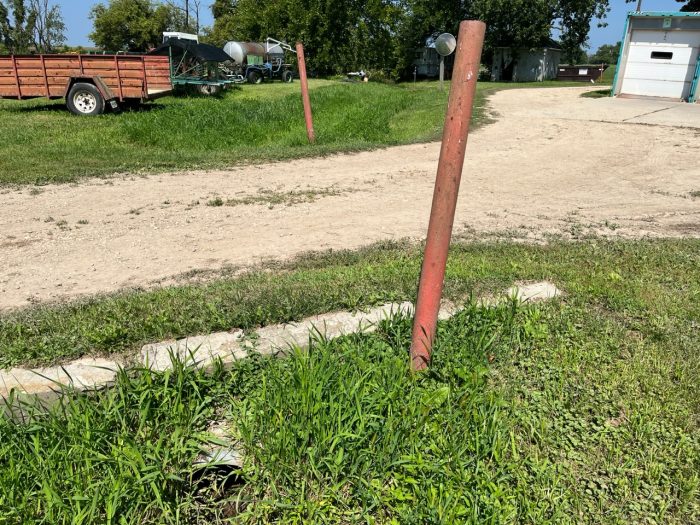
waterway constructed in the 70’s sends runoff to the Gulf of Mexico
The runoff ran right through the length of the greenhouse for 25 years, until I finally bermed a diversion and sunk a trough inside to completely end the problem.
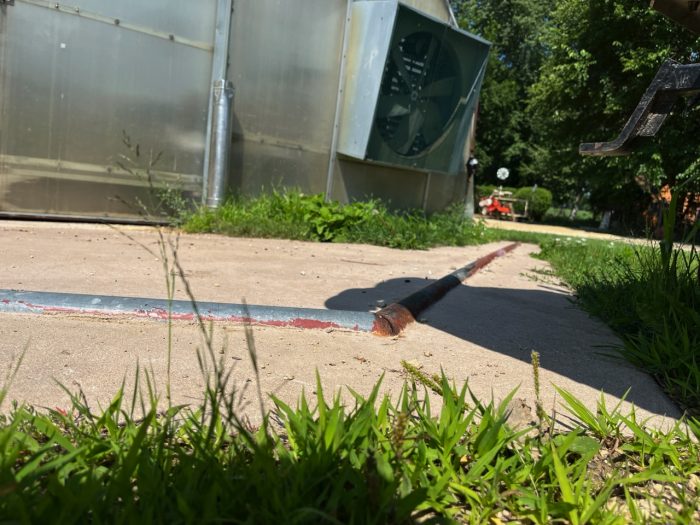
diversion berm of steel pipe upslope from greenhouse
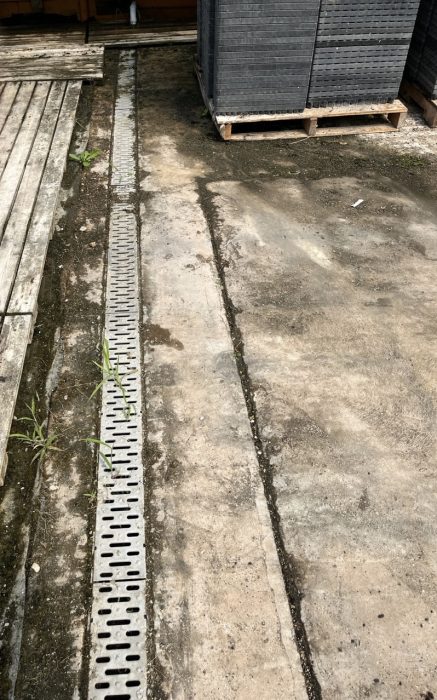
diversion trench in greenhouse catches any water that gets by the diversion berm
Until this past week, our farm shop has been similarly afflicted with runoff. We would often run our equipment through mud to get it into the shop, and then release copious amount of mud onto our cement floor. I pondered a solution on and off for years. Water is tricky, and not at all tricky: it runs downhill; all you have to do is divert it. But how? A deep ditch; a shallow ditch; a swale; a trench; a berm…
Oh, that’s a good idea, but will it work? Will it hold up, or do I just think it will hold up? Will it cause other problems?
The solution requires imaginative time travel into the future, and watching the idea there, in the future, and wondering about it. After this time travel, there is still guesswork involved.
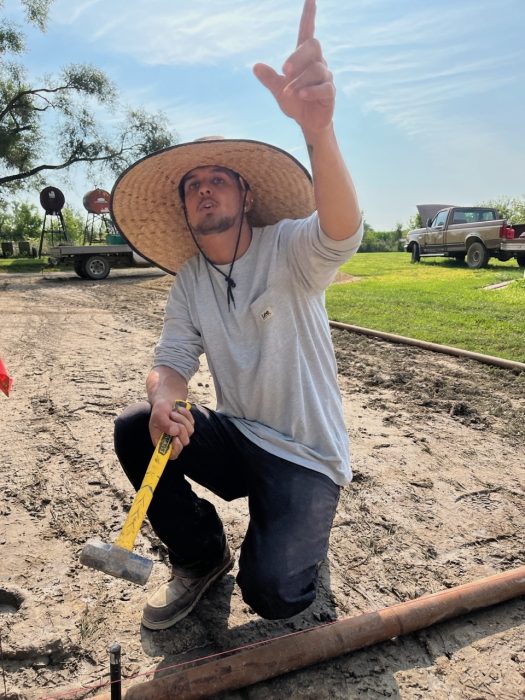
Victor fashions the berm in front of the farm shop
Last Saturday, we constructed a berm of well-pipe and crushed rock to divert the water from the shop. I am not sure if it will solve the problem, or just stop the runoff a bit sooner, creating a mud hole just a few feet further away from the shop. The next rain will be the test.
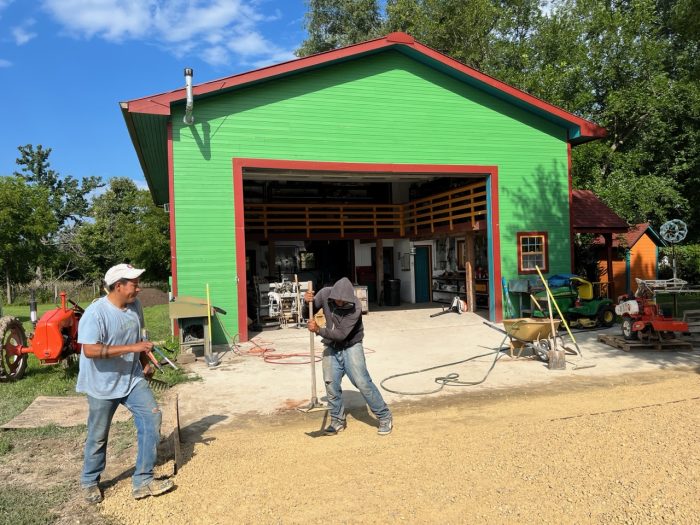
Finishing the berm. The barely visible embedded steel pipe is three inches above the grade of the concrete apron. Think Speed Bump.
Why Did It Happen?
There are myriad things to do on the farm, an inexhaustible list. Some are discretionary, at least for a while, such as diverting the water away from the shop entrance or re-painting a building, oiling a door hinge, trimming a bush. Some are not discretionary for even a little while, such as harvesting your sweet corn or delivering your box. In a way, we cause the discretionary things, and the non-discretionary things cause us.
I have wanted to fix the shop runoff problem for years, ever since the shop was built. I only recently got to it. Why did I finally get to it?
There is a mysterious force within us known as will. People generally talk about what they think. More rarely do people talk about what they feel. Seldom do people talk about what they will. Will, of course, is related to what people do. People talk about what they do, but not so often do they talk about what gets them to do it, the will.
How do we activate or mobilize the will? How do we go from wanting to write a book to writing it, from imagining a song to composing it?
The few old farmers left in this area are astonishing in their will forces. If something needs to be done, they do it. They accomplish extraordinary feats with endurance and resolve. They won’t consult a manual on what’s fair, what’s healthy, what’s just, what’s compliant, or what they deserve—they will just get the thing done that needs to be done. The end.
What begot the will forces in these rustic folks?
Rudolf Steiner said that rhythmic activities when children are young will help to strengthen their will forces when they are adults. (You might think that is a leap, but that doesn’t mean it’s untrue.) Imagine how these old farmers grew up—regular chore times, rhythmic milking of the cows, seasonal harvests and plantings, meals often on a schedule. You might argue that discipline and rigor and even deprivations are the foundation for these later behaviors on the part of farmers. Of course, many things early on influence these farmers’ will forces later in life, but consider that rhythm might play a role.
Rhythmic exercises such as knitting, kneading bread, and playing music are practiced by students today in Waldorf schools. (Waldorf education was founded by Rudolf Steiner.) The intention is in part to strengthen their will forces later in life, or, to be more poetic—to help their dreams to come true.
Listen to the song Temple of the Heart about thinking, feeling and doing by performer friends Lucien Dante Lazar and Ultra-Violet Archer of Velsum, a duo influenced by Rudolf Steiner’s work. (Velsum premiered Temple of the Heart at Angelic Organics in 2022.)
While listening to this music, remember that doing is closely related to willing.
Click here to listen to Temple of the Heart by Velsum.

Artwork for Temple of the Heart by Lucien Dante lazar
Steiner also said that the forces in food had so diminished by the end of the 1800’s, that the connection between people’s intentions and their actions had become scrambled, that realizing one’s dreams was much harder than it had previously been. This is part of why he introduced Biodynamic farming, to begin to restore those forces that had once been present in food. Learn more about Biodynamics here.
Long before I encountered Rudolf Steiner, I had a persistent question, a mystery that taunted me: How do I move my arm? I wondered at this for years in my twenties. How is it possible to move my arm? What is the bridge between wanting to move my arm, and then moving it? Of course, one can espouse all kinds of smartness about nerves and chemicals and electrical impulses and on and on, until the mystery is buried in intellectualism, but I considered it miraculous and mysterious that I could move my arm (and still do consider it miraculous and mysterious).
I suppose that if a person were to consciously master all the processes that need to occur to raise one’s arm, it would take perhaps a whole lifetime of training to get the arm lifted just once, if ever. So, we have will, but Steiner said the will is for the most part asleep. It does something—it raises the arm—but how?
I will disclose here that, even though I have read many references by Steiner to the will, I still don’t know how the will really manifests. However, it rounds out a three-fold picture of the human being as someone who thinks, feels, and wills. If in doubt, listen again to Temple of the Heart above.
I built a berm to divert water from the shop. I had other things to do, important things, necessary things, but I built a berm. What coursed through me to make this berm happen when it did?
Many people will say this is all about priorities and lists and rankings and on and on. There are all sorts of apps for determining what to do, what maybe to do, what not to do, what to do later, maybe, maybe not. But what about that book to write, really? That confession of love or remorse? That overdue apology? That berm? What causes these things, or thwarts them?
What do I do and why? What do I plan to do and then don’t do? What do I do that I don’t plan to do?
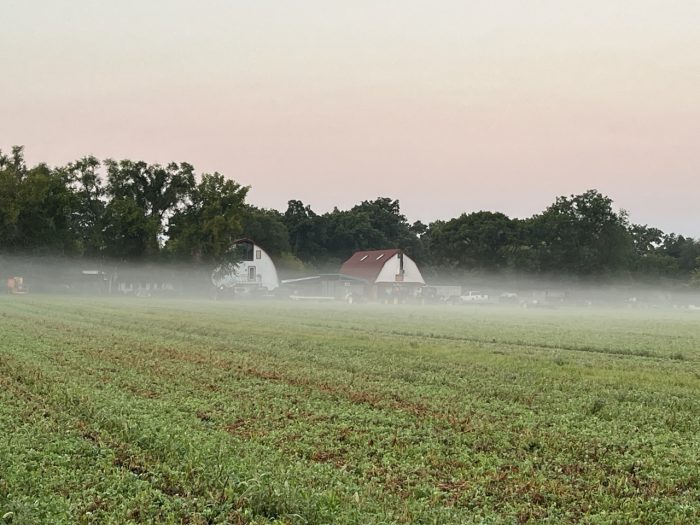
Life, what we do with it, and what we don’t do with it are mysterious.
Warmly,
Farmer John
-
[…] Shareholder Reply to Why Did It Happen? […]
[…] and, perhaps, a sense of destiny. Yet, it did not manifest. In Farm News earlier this season, Why Did It Happen?, I addressed the phenomenon and mystery of will. Some things seem to come about easily with only […]
Leave a Comment




This is a very interesting topic. I realized long ago that I can think for a long time about doing something (e.g getting up from a chair.) Sometimes I do it after having thought about it for a while and sometimes I do it without ever really having thought about it. The other day I was sitting in a chair and I knew I should get up but I didn’t know how to actually do it instead of just thinking about it. After a while I decided to just stop trying to make mysef do it. Instead I decided to just sit there and see what would happen. It only took a few seconds and then I got up.
Sara, You brilliantly address the riddle of will in your post above. I could write more, but my fingers won’t cooperate.
Excellent newsletter. Thank you for sharing your thoughts on will.
Thank you for writing, Jane. It was not easy to write about something so elusive.
your will = intuition & action
interesting equation…